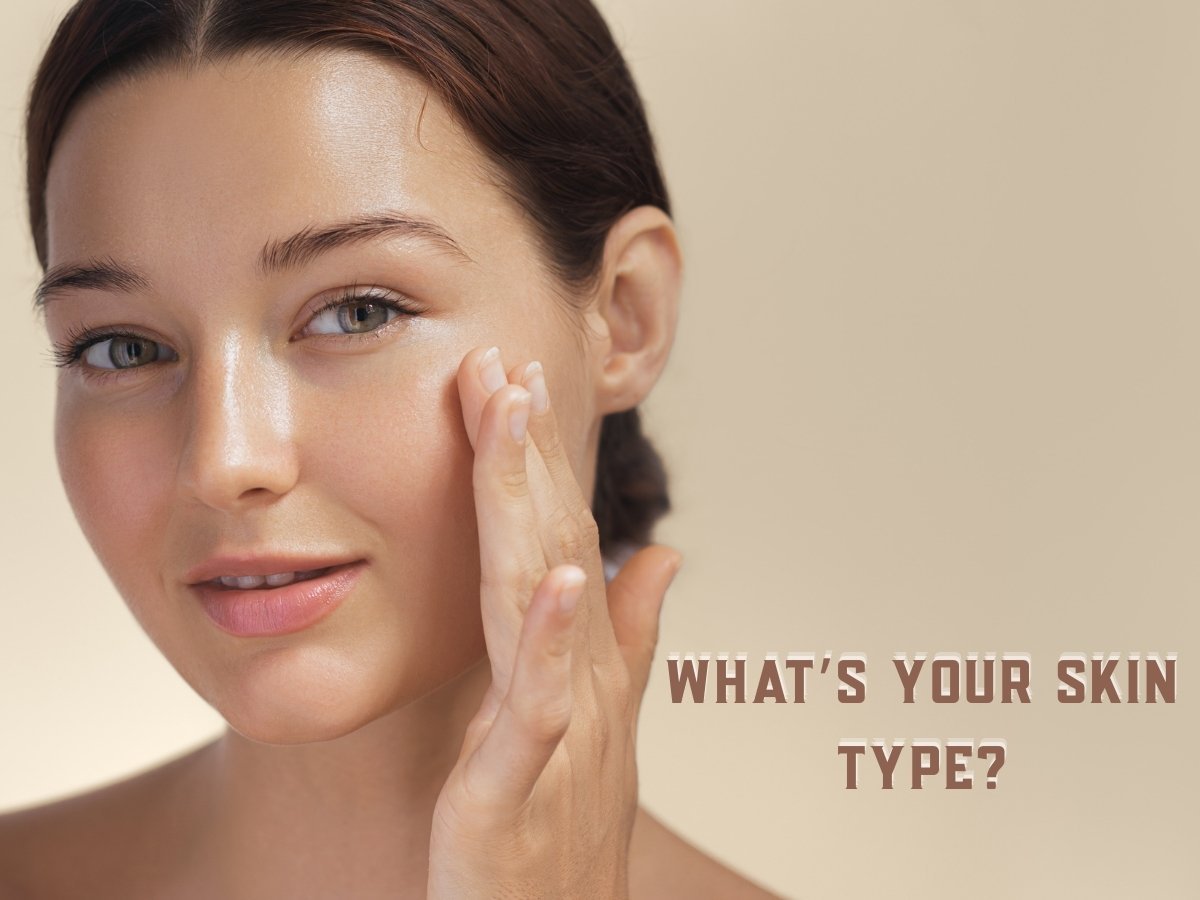What’s Your Skin Type?

Not all skin is the same, and knowing your skin type is the first step to healthy, glowing skin. Dry, oily, combination, or sensitive — learn what your skin really needs.
I’m sure you’ve heard or seen articles or ads on social media about normal, oily, dry or sensitive skin types. But which one is your skin?
The first step in creating the right skin care routine is knowing your skin type. And remember – skin type isn’t permanent. It can change with age, weather, or even lifestyle habits.
What’s the difference? Your type depends on the following factors:
- How much water your skin has, which affects its comfort and elasticity.
- How oily it is, which affects its softness.
- How sensitive it is.
- Do you cleanse every night or use scented soap on your skin, how do you take care of your skin?
Table of Contents
Normal Skin Type
Normal skin means normal, it’s balanced, you know? Normal skin is balanced — not too oily and not too dry. People with this type usually enjoy:
- No or few imperfections
- Barely visible pores
- A smooth texture
- A natural, radiant glow
Care tips: To maintain balance, use a gentle cleanser, light moisturizer, and sunscreen daily if you go out on a sunny day.
Combination Skin Type
Your skin can be normal, dry and oily in various parts of your one skin. Most commonly, the T-zone (forehead, nose, chin) is oily, while cheeks may be dry or normal. Many people have this type of combination skin. This combination skin requires slightly different care in different areas.
Combination skin can have:
- Larger, more visible pores in oily areas
- Blackheads
- A shiny T-zone with drier cheeks
- The face sometimes looks black and sometimes looks shiny with an oily color.
Care tips: Use lightweight gel moisturizers on oily areas and richer creams on dry patches.
Dry Skin Type
If your face often feels tight, rough, or flaky, you may have dry skin. Common symptoms of dry skin include:
- Almost invisible pores
- Dull or uneven complexion
- Rough patches or flakiness
- Redness or irritation
- Less elasticity and more visible fine lines
- In severe cases, skin may crack, peel, or become inflamed. Very dry skin can also turn scaly, especially on the hands, legs, and arms.
What Causes Dry Skin?
Dry skin can be genetic, but it is often worsened by environmental and lifestyle factors, such as:
- Aging and hormonal changes that reduce natural oil production
- Weather conditions are cold or windy and low humidity.
- Overexposure to sun (UV radiation) or tanning beds
- Indoor heating or air conditioning, which strips moisture from the air
- Long, hot showers and baths that remove natural oils
- Harsh soaps, cleansers, or cosmetics with alcohol or strong fragrances
- Certain medications that reduce skin hydration
How to Care for Dry Skin
If you have dry skin, the goal is to restore moisture and protect the skin barrier. Try these dermatologist-approved tips:
- Take short, lukewarm baths instead of long, hot baths.
- Use mild, fragrance-free cleansers; avoid harsh deodorant or antibacterial soaps.
- Gently pat the skin dry with a towel – do not rub while drying.
- Apply a rich moisturizer, cream, or ointment immediately after bathing to lock in moisture. (Creams and ointments generally lock in moisture better than lotions.)
- Apply moisturizer frequently throughout the day, especially after washing your hands.
- Run a humidifier indoors to add moisture to dry air.
- Protect your skin with gloves when cleaning or using detergents/chemicals.
- Look for skin care ingredients like hyaluronic acid, glycerin, shea butter, and ceramides for long-lasting hydration.
I care about and value your skin, so here are some additional tips for you:
- Avoid exfoliating too often; once a week is enough for dry skin.
- Layer a hydrating serum under your moisturizer for added nourishment.
- Drink plenty of water every day — hydration starts from within.
- In winter, use heavy cream to protect against harsh weather conditions.
Oily Skin Type
If your skin often feels oily hours after washing, you may have oily skin. This type of skin is caused by excess sebum (natural oil) production, which can lead to clogged pores and breakouts.
You may have:
- Enlarged or visible pores
- Thick, shiny, or greasy complexion
- Frequent blackheads, acne, or acne breakouts
- The skin looks dull due to the accumulation of dead cells mixed with oil.
What Makes Oily Skin Worse?
Oily skin isn’t always constant—it can change with age, environment, and hormones. Common triggers include:
- Hormonal changes during puberty, menstrual cycle, or pregnancy
- Stress, which increases cortisol and oil production
- Hot and humid weather, which makes skin more greasy
- Using harsh cleansers or over-washing, which strip the skin of its oils, leading to more oil production
- Wrong skin care products, especially heavy creams or makeup that clogs pores
How to Care for Oily Skin
Managing oily skin means balancing sebum production without disrupting the skin barrier. Here are some dermatologist-recommended tips:
- Cleanse twice a day with a mild foaming or gel-based cleanser. Avoid vigorous scrubbing, which can irritate the skin.
- Blot excess oil with oil-absorbing sheets during the day instead of over-washing.
- Use a light, oil-free moisturizer — yes, oily skin still needs hydration!
- Look for products labeled “non-comedogenic”, meaning they won’t clog pores.
- Exfoliate 1–2 times a week with salicylic acid or glycolic acid to clear dead skin and reduce blackheads.
- Avoid touching or picking at pimples, as this can cause scars and slow healing.
- Apply sunscreen daily — choose a matte, oil-free formula to avoid extra shine.
Extra Tips for Oily Skin for Better Care:
- A clay mask (such as bentonite or kaolin) once a week can help absorb excess oil.
- Green tea and niacinamide in skincare can regulate oil production.
- Stay hydrated — dehydration can actually make oily skin worse.
- Keep makeup minimal and use oil-free or mineral-based foundations.
Sensitive Skin Type
Sensitive skin reacts more easily than other skin types and often feels uncomfortable when exposed to certain products or environments. It can be temporary (like after using a strong product) or a long-term condition.
- Characteristics: redness, irritation, itching, burning.
- Causes: reactions to products, weather, lifestyle triggers.
- Dryness
- In severe cases, skin may develop rashes, bumps, or peeling
If you have sensitive skin, try to learn what causes your reactions and stay away from them. Many things can be the reason, but often it’s the skin care products you use every day.
Simple At-Home Tests to Know Your Skin Type
Bare-Faced Test
- Wash your face with a gentle cleanser, pat dry, and leave it bare for 30 minutes.
- If it feels tight → Dry skin
- If it looks shiny all over → Oily skin
- If only your T-zone shines → Combination skin
- If it feels balanced → Normal skin
Blotting Paper Test
- Press blotting paper on different areas of your face.
- Little to no oil → Dry or normal
- Oil in the T-zone only → Combination
- Oil across the whole sheet → Oily
Why is it important to know your skin type?
Knowing your skin type helps you:
- Pick products that work for you
- Avoid irritation or breakouts
- Prevent premature aging
- Build a routine that keeps your skin healthy and glowing
To learn about skin and how skin damage can occur or for more in-depth knowledge, visit the Wikipedia Skin page. Click on the skin.
The 6 Basics of Skin Care
No matter your skin type, these rules apply to everyone:
- Use a broad-spectrum sunscreen daily.
- Limit direct sun exposure; wear hats and sunglasses.
- Don’t smoke.
- Drink plenty of water.
- Wash your face gently and never sleep with makeup (women).
- Moisturize regularly.
Conclusion
Understanding your skin type isn’t just about labels like dry, oily, or sensitive it’s about giving your skin what it truly needs. When you know your skin type, you can choose the right products, avoid irritation, and build a routine that keeps your skin healthy, glowing, and protected. Since your skin type can change with age, lifestyle, or even the weather, checking in with your skin regularly is key. Remember, the better you know your skin, the better care you can give it and healthy skin is always the most beautiful. If you are so worried about your skin or skin type and want to get the best output for your skin type, just click on the beauty section, this is lucky for you.
